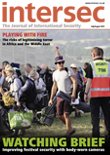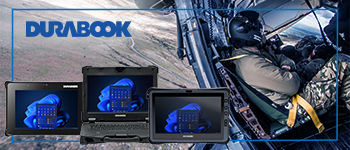The X-factor
Vincent Deery of 3DX-Ray talks about the versatility and applications of portable x-ray scanners
Flat panel portable x-ray scanners long ago established their value as an essential tool for any bomb disposal team and are widely employed in EOD roles throughout the world. Their mobility, accuracy and speed of use gives EOD operators the ability to view what is inside a bag or package in situ, while maintaining a safe distance.
This was a game changer for EOD operators. For the first time, they were able to see a detailed image of the contents of a suspect package or bag. They could determine, not only if it was a threat, but what type of threat, without the potentially dangerous business of opening or moving the object, or alternatively, disrupting or destroying it on site, with all the potential collateral damage and associated disruption that would cause.
Once an operator has determined whether or not a suspect package presents a threat, it enables the authorities to make quick decisions to safely evacuate a site but more usually, to avoid the mass disruption that can be caused to public spaces and transport through unnecessary evacuation.
As the technology is continually developed, colour differentiated scans have been introduced which have made it possible to determine the nature of the materials being scanned. Orange shows organics, such as explosives, chemicals and drugs, as well as more innocent items such as foodstuffs. Blue is for metals, such as guns, knives, hand grenades, metal pipe bombs as well as IED components such as the power sources, switches, circuit components and metallic fragmentation. Green is for inorganic materials like black powders and aluminumised homemade explosives. Grey scale is used for recognition of shapes and the form of objects.
But not all portable scanners are created equal, so it is important to note that most portable x-ray systems on the market only use two-colour scans and leave out the colour blue, this is because of a lack of understanding about how materials imaging works, which can put operators at a severe and potentially dangerous disadvantage. So, accurate three-colour differentiation is essential. Accuracy not only relates to the correct colourisation of the specific object but also to the consistent colourisation across the entire scanned area.
Another key factor when selecting a portable x-ray system is the image quality. What determines the overall image quality is a combination of both the detector panel and the x-ray generator. The focal spot size of the generator and the panel together determine where you will get the best quality image. If the focal spot size of the generator is poor, the best image will be right at the panel’s surface. That is why most vendors demonstrate tests close to the panel. The reality is that when you are x-raying a bag, the threat will not generally be right next to the panel, so your image quality needs to be not only good at the panel, but also as you move away. With a pulsed x-ray, the image quality plummets as you move away from the panel significantly, but with a constant potential generator, it actually improves. So, it is important to select a portable x-ray system with a constant potential generator.
And finally, when selecting a portable x-ray system, size really does matter. It is important to have a system with a large imaging panel that can scan a large area of a vehicle or an entire case or several objects together.
Though originally designed primarily for bomb disposal officers, it was not long before other security and law enforcement agencies realised the potential of these systems and became early adopters of the technology. As a result, we have seen a growing number of sales and customer enquiries from a whole variety of agencies as well as private security firms, to use in an ever widening variety of applications.
Police forces in particular are utilising these systems for numerous applications, including vehicle check point searches, for contraband such as drugs or weapons. Screening a vehicle for a potential threat can be challenging but with large panel systems you can image a large section of a vehicle very quickly. Advanced line-scan digital radiography (DR) panels also allow you to re-scan a specific area from the first image without having to reposition the panel. Software will automatically move the detector array inside of the panel to the exact location you select. You can then re-scan that specific area and adjust the kV, mA and Scan time to improve penetration in that area alone. This feature is incredibly useful and is unique to constant potential generators.
Other applications for law enforcement include temporary security screening at public venues and events, especially at times of heightened security threat. The Italian police have 40 systems, which are used for mobile baggage checks at major tourist attractions around Rome.
Specialist agencies such as serious organised crime, counter-terror and drug enforcement use portable x-ray systems to rapidly examine and assess threats and suspect items on site, such as bags, laptops and furniture, as well as search for evidence.
Another advantage is that you do not need to compromise on the penetration and imaging area. You can still get good penetration on thick materials, such as scanning for objects hidden in walls. The systems are also able to help them to locate and identify cameras and surveillance equipment and other electronic devices.
Within the prison community, prisoners have always proved highly innovative and ingenious when it comes to hiding contraband; whether that is weapons, mobile phones or drugs. It is in fact a never-ending cat-and-mouse game between inmates and prison staff. Portable x-ray scanners provide a quick and simple way of searching for hidden contraband within prisoner’s furniture and personal items, without dismantling them, leading to less confrontational prisoner-staff interactions and helping to reduce tensions in what can be a dangerous and volatile environment. The systems can also be used to scan the many delivery vehicles that enter and leave prisons every day.
VIP protection is another application where these systems have proved invaluable for both secret service officers and private security companies. VIP security poses some particular challenges, especially when it comes to public meetings, events and travel. VIPs routinely travel a lot and may visit multiple countries on trips and multiple locations in a single day as a part of their itinerary.
Portable x-ray scanners give security teams the opportunity to set up temporary security zones around their VIP. The scanners are used for security sweeps of vehicles, meeting rooms, venues and hotel rooms. Security teams are able to control access to the VIP with baggage scans that only take a few seconds, causing minimum disruption and inconvenience. The portability of the system means it can be carried on a plane, in a helicopter or in the trunk of a vehicle and sent ahead with the advance team to each new location, enabling security teams to carry out a sweep and be ready for screening attendees at the start of the next meeting or event.
Both government and private Technical Surveillance Counter Measures sweep teams are able to locate elusive electronic devices hidden in secure buildings, meeting rooms, board rooms, hotels or anywhere else highly sensitive information is being exchanged. This negates the need to dismantle tables, desks, lamps, ornaments etc. to confirm that there is indeed a device.
At the borders, x-ray systems are used to perform vehicle checks by search teams at fixed and temporary crossings. They are ideal for scanning tyres and cavities not visible to regular searches and are especially useful working in conjunction with K9 units, to confirm finds and avoid false positives.
Ports, airports and travel hubs, like train and bus stations, are all areas where we see systems used routinely. In fact, any public spaces where you have large throughput of people and left baggage is a regular issue, you have the potential for mass disruption.
Within the private sector the list of actual and potential users is endless. Any large office or office complex may not have a sufficient threat level to justify fixed baggage screening systems for regular employees and visitors. But at times of increased threat level, the ability for office security staff to be able to deploy a portable x-ray system as a part of their access control security, not only increases their actual security but also acts as a deterrent.
For event security such as concerts, sports and festivals where fixed baggage screening systems is not always feasible, portable x-ray systems can be deployed with no need for any infrastructure.
Good portable x-ray systems are what the military would call a ‘force multiplier’. They are fast, accurate, portable, versatile and relatively inexpensive. So, in the hands of trained security staff are an incredibly powerful tool.
It is essential to make sure your vendor offers a first-rate after-sales service and training support package. That support should include the ability to update and maintain the system in the field because no matter how good the portable x-ray system, if your staff are not properly trained and supported, you will never achieve the best results.
Vincent Deery is Sales and Marketing Director at 3DX-Ray Ltd









